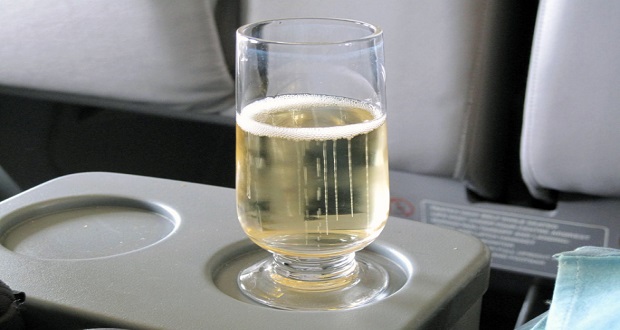
Charee Stanley likes to keep it dry in the sky. The Muslim flight attendant claims that she was suspended from her job at Atlanta-based ExpressJet for refusing to serve alcohol, a practice that violates her religious beliefs. As a result, Stanley filed a discrimination claim with the Equal Employment Opportunity Commission (EEOC) demanding that the airline reinstate her and accommodate her beliefs.
She’s not the most famous—or infamous, depending on whom you ask—person who’s currently in the news for complaining that her employer trounced her right to religious freedom in the workplace. Kim Davis, the Kentucky town clerk who refuses to issue marriage licenses to same-sex couples, was recently jailed for failing to uphold her job duties. Of course, Davis is Christian. Stanley is not. So guess whose rights people seem to care about more?
Regardless, Stanley, started working at ExpressJet about three years ago. Later, she converted to Islam but realized only this year that her faith doesn’t permit her to drink or serve liquor. After she approached her boss about the issue, she was allegedly told to work out an arrangement with fellow flight attendants. So she did. According to her attorney, Lena Masri of the Council on American-Islamic Relations, “We know that this arrangement has worked beautifully and without incident and that it hasn’t caused any undue burden on the airline.”
Last month, however, Stanley says a coworker complained that she wasn’t fulfilling the requirements of her job. As a result, Masri says that the airline disciplined Stanley by placing her on administrative leave.
“I don’t think that I should have to choose between practicing my religion properly or earning a living,” Stanley told CBS News. “I shouldn’t have to choose between one or the other because they’re both important.”
ExpressJet, meanwhile, issued this non-comment comment: “At ExpressJet, we embrace and respect the values of all of our team members. We are an equal opportunity employer with a long history of diversity in our workforce.”
This seems an easy case to decide. If you don’t like or won’t do your job, then quit.
That’s not the solution. Rather, the airline should provide a reasonable workplace accommodation, which it seems to have done prior to a coworker’s complaint. If Stanley won’t serve alcohol, it seems reasonable for other flight attendants to take on that role. However, ExpressJet is a small airline, so what happens if Stanley were the only flight attendant on a plane? Well, in that case, it seems unreasonable to ask her employer to accommodate her. If there’s no reasonable way to accommodate your faith, then…there’s no reasonable way to accommodate your faith.
The EEOC has six months to decide this case. How would you rule?


















